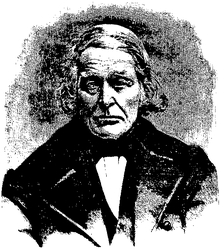John Neergaard (politician)
John Gunderson Neergaard (born November 11, 1795 in Romundstad, Rindal , Møre og Romsdal , † June 15, 1885 in Dønnem in Øre, Gjemnes , Møre og Romsdal) was a Norwegian politician and peasant politician. Neergard fought for greater participation of the peasant class in Storting , which had previously been ruled by officials and academics, and was Norway's first great agitator.
Life
His parents were the landowner Gunder Jonson Neergaard (1737-1806) and his wife Helga Johnsdotter Sande (1764-1850). On September 13, 1845 he married the landowner and widow Kirsten Iversdotter Dønheim, née Røste (July 25, 1807– January 22, 1880), daughter of the landowner Ivar Erikson Røste (1772–1830) and his wife Kirsti Jonsdotter Bakken (1776–1853 ).
At a young age he hired himself as a shepherd. Constantly exposed to the weather, he developed gout . He borrowed medical textbooks from a doctor and developed a keen interest in the field. As an adult he cared for the sick and let them live with him. So he came into conflict with the law against quackery . He was also trained in law, having worked intermittently in a law firm, and was a good speaker. So he helped many farmers against the bureaucracy.
In 1836 Neergaard became a royal feudal lord in Øre in Nordmøre and remained so until 1854. Then he was initially suspended on charges of fraudulent transactions. Three years later he was convicted and finally removed from office. He has not played a political role since then. But he was mayor of Øre for two more terms.
He was a contradicting man. On the one hand, he campaigned for the farmers. But after receiving insider tips on how to invest safely in real estate, he bought many farms together and had up to 13 farms at the same time. He lent money at high interest rates. Although he participated in laws against the production of spirits, he ran his own distillery at home. He wasn't a good farmer. The rural economy of his farm was run by his wife.
Political activity
When elected to Storting in 1827, Neergaard was elected a member of the Romsdals office. The officials' representatives viewed the representative of the peasant class with suspicion. And although he was elected as a substitute candidate in 1830, the officials in Storting feared that he would admit that he was ill. Instead, this summer Neergard wrote his work En Odelsmands Tanker om Norges nærværende Forfatning tilligemed en Samtale indeholdende Veiledning for Bønder til en rigtigere Fremgangsmaade ved Udkaarelsen af Valgmænd og Representatives (popularly called "Ola-boka current version") with a conversation about the guidance for farmers on the correct procedure for the selection of electors and delegates). This book contained a discussion between a city dweller, a mine worker, a sexton, and a farmer. In the beginning, the farmer was completely disinterested in politics in Storting. In the course of the discussion, the farmer realizes the importance of storting. The aim of the book was to make the farmers understand that they could not expect any advantages from the Storting as long as the officials there negotiated alone, and called for the farmers to support the farmers. The book received several editions, the sixth edition in 1978.
In the years that followed, Neergaard toured the country and distributed his book. This was the first political agitation trip in the country. In order not to come into conflict with the electoral law of 1828 and the law against vagrancy, he traded horses and fish at the same time. He did not take part in any political meetings, but went from farm to farm and talked to the farmers. The result was that in the Storting election of 1833 the number of farmers rose from 21 to 45, while the number of civil servants fell from 43 to 35. Neergaard moved into Storting and became one of the farmers' spokesmen.
The most important goal of the farmers was the expansion of local self-government. To this end, the Storting passed a legislative proposal mainly formulated by Neergaard. This law was too democratic for the king and the law was not approved until 1837 after a royal commission found the text useful. Neergaard is therefore referred to as the father of the law governing the parish council.
literature
The article is essentially based on Norsk biografisk leksikon .
- Eirik Helleve: John Neergard . In: Norsk biografisk leksikon
Individual evidence
- ↑ OA Øverland, Edv. Bull: Neergaard, John Gunderssøn . In: Christian Blangstrup (Ed.): Salmonsens Konversationsleksikon . 2nd Edition. tape 17 : Mielck – Nordland . JH Schultz Forlag, Copenhagen 1924, p. 792 (Danish, runeberg.org ).
- ↑ OA Øverland, Edv. Bull: Neergaard, John Gunderssøn . In: Christian Blangstrup (Ed.): Salmonsens Konversationsleksikon . 2nd Edition. tape 17 : Mielck – Nordland . JH Schultz Forlag, Copenhagen 1924, p. 792 (Danish, runeberg.org ). There it is said that he did not make any profit from the bogus deals.
| personal data | |
|---|---|
| SURNAME | Neergaard, John |
| ALTERNATIVE NAMES | Neergaard, John Gunderson (full name) |
| BRIEF DESCRIPTION | Norwegian politician, member of the Storting |
| DATE OF BIRTH | November 11, 1795 |
| PLACE OF BIRTH | Romundstad, Rindal , Møre og Romsdal |
| DATE OF DEATH | June 15, 1885 |
| Place of death | Dønnem in Øre, Gjemnes , Møre og Romsdal |
